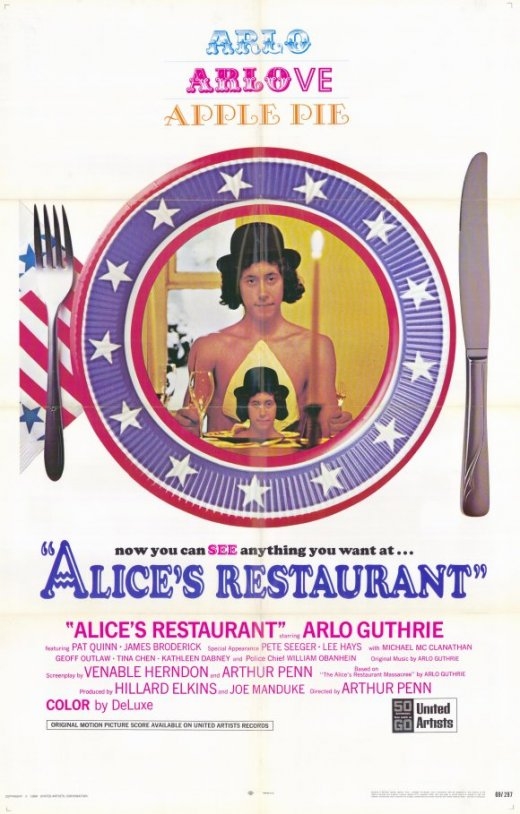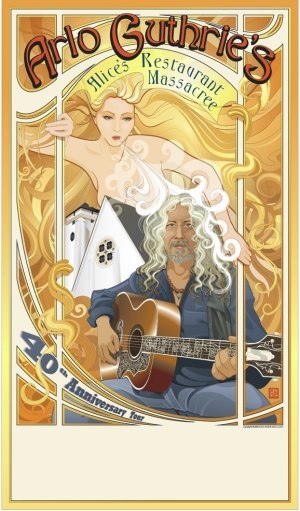
ALICE’S RESTAURANT (1969, directed by Arthur Penn, 111 minutes, U.S.)
 BY DAN BUSKIRK FILM CRITIC Curiously, there is a a dearth of songs to sing around the Thanksgiving dinner table, despite being based on ideas of gratitude and family — I blame those uptight Pilgrims. Well, there is Arlo Guthrie’s “Alice’s Restaurant Massacree,” the eighteen-minute talking blues song by the then nineteen year old son of folk legend Woody Guthrie. The song chronicles a post-Thanksgiving dinner trip to the dump which results in a charge of littering that ultimately renders the young Guthrie unfit to serve in the war in Vietnam. Young Arlo’s storytelling was so vivid that Hollywood wanted to base a counter-culture movie on the tale. The Princeton Public Library is screening that film, Alice’s Restaurant, on its fortieth year anniversary, this Sunday November 22nd at 3pm.
BY DAN BUSKIRK FILM CRITIC Curiously, there is a a dearth of songs to sing around the Thanksgiving dinner table, despite being based on ideas of gratitude and family — I blame those uptight Pilgrims. Well, there is Arlo Guthrie’s “Alice’s Restaurant Massacree,” the eighteen-minute talking blues song by the then nineteen year old son of folk legend Woody Guthrie. The song chronicles a post-Thanksgiving dinner trip to the dump which results in a charge of littering that ultimately renders the young Guthrie unfit to serve in the war in Vietnam. Young Arlo’s storytelling was so vivid that Hollywood wanted to base a counter-culture movie on the tale. The Princeton Public Library is screening that film, Alice’s Restaurant, on its fortieth year anniversary, this Sunday November 22nd at 3pm.
The song’s whimsical, politely anti-war stance and Arlo’s low-key hippie demeanor would seem to lend themselves easily to a satiric coming-of-age comedy along the lines of Mike Nichols’ The Graduate or Coppola’s You’re A Big Boy Now. Surprisingly, the project fell into the hands of director Arthur Penn, a theater director whose film work in The Miracle Worker and the groundbreaking, controversial hit Bonnie And Clyde had suddenly made him one of the hottest directors in Hollywood. Penn specialized in stories of society’s outsiders, creating rich portraits of eccentrics attempting to escape the constrictive mores of the day. In Alice’s Restaurant, Penn uses his deep well of talent to capture the character’s rural leanings, their language, their psychologies, sex and humor but there is a reason’s the film has been dismissed as among the least of his impressive string of films from the ’60s and ’70s. Despite the deep feeling for outsiders that Penn’s films always possess, with Alice’s Restaurant he reveals the attitude perhaps unavoidable for a man in his late forties in 1969: Penn hated hippies.
On the commentary track of the 2001 DVD release, Arlo is complimentary to Penn but he does make this  careful observation, “I don’t think (he) understood everything the culture had to offer.” In fact, the time of Arlo’s life documented in the title song was a happy one. The real Alice and Ray Brock were both teachers at the alternative school in Stockbridge Mass where Arlo was sent to as a teen. He graduated and left for school in Billings, Montana, where he briefly studied to be a park ranger before dropping out. He returned to the Stockbridge area, splitting his time between the Berkshire Mountains and NYC, where his father was in the final stages of Huntington’s Chorea.
careful observation, “I don’t think (he) understood everything the culture had to offer.” In fact, the time of Arlo’s life documented in the title song was a happy one. The real Alice and Ray Brock were both teachers at the alternative school in Stockbridge Mass where Arlo was sent to as a teen. He graduated and left for school in Billings, Montana, where he briefly studied to be a park ranger before dropping out. He returned to the Stockbridge area, splitting his time between the Berkshire Mountains and NYC, where his father was in the final stages of Huntington’s Chorea.
Also living in the Berkshires was Arthur Penn, who by 1968 had mastered theater (directing the Tony award-winning play Wait Until Dark with Lee Remick and Robert Duvall), television (on teleplay series Playhouse 90) and film, where he had just scandalized the nation with his violent and nihilistic hit film Bonnie & Clyde. In Arlo’s eighteen-minute underground hit, Penn heard something intriguing in the story and because he knew the people and the places in the song, he made it his next project. Writing along with Venable Herndon, Penn wrote the only script he would write in his long career (along with Venable Herndon). They had the story from the song: a Thanksgiving dinner, the trash dumping, the court date, arresting Officer Obie and the draft board, but then what?
Penn decided to incorporate Arlo’s life story into the film; he’s the son of Woody Guthrie, a folk singing upstart and Arlo’s best friend Geoff Outlaw was cast his best friend. The house Alice and Ray live (filmed in the couple’s actual home) becomes something else entirely. We first meet the couple during the religious ritual of de-sanctifying the church they have recently bought for their home. More than a home really, as the Brock’s church becomes a commune to assorted faceless hippie youth, dependent on the Brock’s as a surrogate Mom and Dad, a free meal always available thanks Alice’s constant slaving and the restaurant’s charitable manner.
This anti-Capitalist paradise can’t last and the arrival of vulnerable junkie jailbird Shelly (Micheal McClanathan, resembling a young David Lee Roth) sets up a disturbingly Oedipal situation with both Ray and the younger Shelly sleeping with a large-hearted Alice. The film is filled with the low-key performances of non-actors (the real “Officer Obie,” William Obanheim performs marvelously as himself) but Penn brings in professionals to wring the most angst out of the situation (Matthew Broderick’s father James as Ray and the excellent Pat Quinn as Alice). They scream, they cry, they get wasted on smack and end up adding a layer of Biblical sturm und drang completely out of character of both Guthrie’s life story and his song. The ending is grotesque, with the Godless church turning into a scene of Bacchanalia, Ray’s voice sounding like an eerie child’s as he huffs helium, imploring the congregants to get “higher, and higher, and higher!”
Arthur Penn is one of the screen’s great directors of actors, shepherding eight Oscar-nominated performances and three Oscar winners, so he really gets the most out of this pain-rich scenario. The real Ray and Alice are stalking around in the background as well, as are many of Arlo’s friends, brought along to lend the film its authentic counter-culture atmosphere. Shot along the little towns among the Berkshires, cinematographer Michael Nebbia perfectly captures that sort of hippie rural chic that Dylan and The Band were selling at the the time. With its actual locations and Penn’s sharp eye for local color Alice’s Restaurant is an unusually vivid document of the time.
But the film was never the hit they hoped for, with critics or audiences (although Penn would pick up a Best Director nomination). Despite all its rough-hewn authenticity, Penn sees only hidden dangers in the hippie movement’ idealism. Arlo is a sort humble, princely observer in the film and he escapes those hippie “small “c” communists at the end as they collapse into their childish fantasies. For Penn, like Clyde Barrow and Bonnie Parker or the Native Americans in Little Big Man, these individualists are doomed, born for tragedy and hard truth. Penn’s is a romantic vision but no more so than Guthrie’s himself, who now owns the church from the film. Renamed The Guthrie Center, it functions as a concert hall and an interfaith charity organization. When you hear Guthrie discuss his star vehicle today he shakes his head at Penn’s dark hippie vision, but it is with the bemusement of a man who has had the last laugh.
Dan Buskirk will discuss Arthur Penn, Arlo Guthrie and the film Alice’s Restaurant after its screening this Sunday, November 22nd 3pm at The Princeton Public Library, 65 Witherspoon St., Princeton, NJ 609.924.9529
